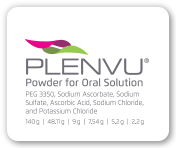INDICATION
PLENVU® (polyethylene glycol 3350, sodium ascorbate, sodium sulfate, ascorbic acid, sodium chloride and potassium chloride for oral solution) is an osmotic laxative indicated for cleansing of the colon in preparation for colonoscopy in adults.
IMPORTANT SAFETY INFORMATION
- PLENVU® is contraindicated in patients with gastrointestinal (GI) obstruction, bowel perforation, gastric retention, ileus, toxic megacolon, and hypersensitivity to any of its ingredients.
- Advise patients to hydrate adequately before, during, and after the use of PLENVU®. It is encouraged that patients drink additional clear liquids to help avoid cases of fluid and electrolyte abnormalities. Fluid and electrolyte disturbances can lead to serious adverse events including cardiac arrhythmias, seizures, and renal impairment.
- There have been rare reports of serious arrhythmias associated with the use of ionic osmotic laxative products for bowel preparation. These occur predominantly in patients with underlying cardiac risk factors and electrolyte disturbances. Consider obtaining ECGs in patients at an increased risk of serious cardiac arrhythmias.
- Use PLENVU® with caution in patients with a history of seizures and those at an increased risk of seizures, including patients taking medications that lower the seizure threshold, patients withdrawing from alcohol or benzodiazepines, or patients with hyponatremia.
- Use PLENVU® with caution in patients with renal impairment or those taking concomitant medications that affect renal function. Advise these patients to adequately hydrate before, during, and after the use of PLENVU® and consider performing laboratory tests in these patients.
- Do not administer PLENVU® to patients with GI obstruction or perforation. If GI obstruction or perforation is suspected, perform appropriate diagnostic studies prior to administering PLENVU®.
- Use caution in patients with severe ulcerative colitis.
- Patients with impaired gag reflex or those prone to regurgitation or aspiration should be observed during the administration of PLENVU®. Use with caution in these patients. Do not combine PLENVU® with starch-based thickeners.
- Use PLENVU® with caution in patients with glucose-6-phosphate dehydrogenase (G6PD) deficiency.
- Phenylalanine can be harmful to patients with phenylketonuria (PKU). PLENVU® contains phenylalanine, a component of aspartame. Each PLENVU® treatment contains 491 mg of phenylalanine.
- PLENVU® contains polyethylene glycol and may cause serious hypersensitivity reactions including anaphylaxis, angioedema, rash, urticaria, and pruritus. Inform patients of the signs and symptoms of anaphylaxis and instruct them to seek immediate medical care should signs and symptoms occur.
- In clinical trials, the most common adverse reactions (>2% of patients taking PLENVU®) were nausea, vomiting, dehydration, and abdominal pain/discomfort. Adverse reactions were similar between the two dosing regimens.
To report SUSPECTED ADVERSE REACTIONS, contact Salix Pharmaceuticals at 1-800-321-4576 or FDA at 1-800-FDA-1088 or www.fda.gov/medwatch.
Please click here for full Prescribing Information.


.png)
.png)
.png)
.png)